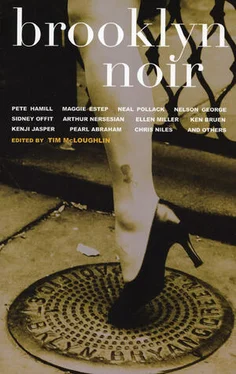I was a weedy child at sixty pounds. My father was a bridgeman. A workingman. To work, in the true, original sense, meant to move heavy objects, to transfer energy from one system to another, causing an object, against its own resistance and stationary inertia, to move. Work called for muscle, math, multiplication. Work was the product of the force used to move something stubbornly heavy and the distance the object had successfully moved in the direction of that force. Dad had been working for a long time.
His biceps were strip steaks, marbled not with fat, but lined with web-works of veins materializing from under his skin. “Put them back! Put them back inside!” I’d cry, when I was little — which, by the time I turned eight, I adamantly decreed I wasn’t, not anymore — while futilely pushing and pressing individual bulging veins back underneath his skin to keep him intact, to return his veins to their proper place inside, where all matters blood-related belonged. And Dad’s thighs and calves were sometimes hard to look at without contemplating mint jelly.
The man had muscle. Nonetheless, he was determined to bench-press me, sans bench, every night. For strength. For practice. A delaying tactic, I understood later, but then, like a fool, I’d already reversed my own prior, better judgment. Stupidly, I again hoped, and I believed that his teasing promise had finally and for real tipped away from the tease toward its promise: the bridge — although I would have gone with him anywhere. I would have had to have gone with him anywhere. Lucky, lucky me: As it happened, I’d been hungering to go up on a bridge with him for years, but if he’d have wanted to go somewhere else, or if he’d have wanted to do something else, there wouldn’t have been much else for me, other than to go, and to do.
After dinner we’d meet in the living room for practicing. He’d go horizontal on the floor, stretching his arms to their widest span. Like a career waiter, deftly steadying a sterling tray, piled nearly to toppling with fragile tableware, he’d broaden and flatten his right hand’s fingers, balancing me delicately, without a flinch, at the bony hollows of my throat and chest. I’d soften my scrawny structure, make myself pliant. When he’d stabilized my torso, he’d wrap his flung left palm around my ankles for lift-off. Muscles and veins popping out all over him, our bodies perpendicular, his arms pumped my body — first up and aloft, far from his, then down, low and close — up and down, up and down until I was flying and falling, flying and falling, breathless, giddy, shrieking, stoned with giggles. He grunted with pretend exertion, like it was so laborious. When he decided we were finished — always, always, he made this determination unilaterally, so I could never anticipate when the end was approaching and temper my wishes accordingly — he lowered me, I rolled off him, and he moaned, exhaling gigantically, like he was so winded.
Bedtime followed. He’d toss me like a gunny sack over one shoulder and carry me firefighter-style to the living room couch, which was my bed, right there in the room where we practiced. Not far to get to my bed. No transitional cooling-off time. After the wild velocity and proximity of practicing, the end’s abruptness, the severance accompanying his “Goodnight, you” — separations always hitting the one who stays behind harder than they hit the one who goes on ahead — I’d marinate in a living room redolent with breath, heat, his man-smell, my flannelly kid-having-fun smell, while he went away to his own bedroom. I’d have trouble falling asleep in that still-buzzing living room. Overstimulated, alone, all jagged up, for hours I’d twist myself into pretzels of indecision.
Should I or shouldn’t I? I shouldn’t. I shouldn’t. I knew that I shouldn’t.
Much later on, comfortable without the burden and benefit of empirical evidence to negate or support my hypothesis, I’d maintain that sexual acts per se were meager foreplay for the truer pleasure, the deeper intimacy, of shared sleep. Whoever has access to a helpless, sleeping body owns it, controls it, can do anything to it, so it was natural that I’d only ever slept with Dad. Sleeping with him was bad. I knew that. I also knew that bad things weren’t necessarily wrong things, but interrupting his sleep was criminal; if we’d had religion, it would have been sinful. Hours before completely confessing to my sorry self that I’d already decided to go ahead and do it, I’d cringe with the afterward-shame, the dirty regret that should have sunk in later — or the next morning, his eyes still bloodshot, his features absent of all signs of being rested — and which should have deterred me. I hated myself for interfering with his sleep, even more so for loving to do it. For exploiting the wakeful one’s God-like power of ultimate say-so over a defenseless body. He worked very hard at a dangerous job to keep me housed, schooled, fed, clothed. He needed rest. Badly. Too often, always knowing better, I couldn’t defeat the urge to do wrong, especially once the light appeared, and I’d re-remember that not having closed my eyes during the night would neither retard nor prevent the arrival of the too-bright morning, of another next day with unbounded possibilities to be survived or not.
The dark was a mild worry. What kept me awake and afraid was me. Something about me. I scared myself. Lots. Grow up. My thinking-inside-myself voice told me off. Stop being a baby. I’d abandon the couch, slip into his grown-man’s bed, straddling his chest, gently, gently alighting my fingers along his lash-lines. Softly, softly, and firmly, too, I’d press his lids up and open, until I saw his red-webbed eyes’ whites, and I asked, I begged, “Dad? Are you in there?”
“Of course, Bee,” he’d mumble sleepily. As if the answer was a certainty beyond all doubt, that his still being in there, inside himself, whole within his own intact body, as planned, as promised, would always be the case.
NEW YORK CRIMINAL LAW STATUTES: PENAL LAW, PART 3.
Title O. Offenses against Marriage, the Family, and the Welfare of Children and Incompetents.
Article 260. Offenses Relating to Children, Disabled Persons, and Vulnerable Elderly Persons.
§ 260.10. Endangering the welfare of a child
A person is guilty of endangering the welfare of a child when:
1. He knowingly acts in a manner likely to be injurious to the physical, mental or moral welfare of a child less than seventeen years old or directs or authorizes such child to engage in an occupation involving a substantial risk of danger to his life; or
2. Being a parent, guardian or other person legally charged with the care or custody of a child less than eighteen years old, he fails or refuses to exercise reasonable diligence in the control of such child to prevent him from becoming an “abused child,” a “neglected child,” a “juvenile delinquent,” or a “person in need of supervision,” as those terms are defined in articles ten, three and seven of the family court act.
Endangering the welfare of a child is a class A misdemeanor.
If caught, that’s a year or less in jail. No one with even half a brain in his head gets caught.
Canarsie Pier’s stink of briny rot rendered plausible what otherwise seemed unlikely: that Canarsie had once been a sleepy fishing village. Ninety years before Dad and I stood at our jump-off point for more sophisticated practicing — “a whole new level,” he’d said — most of the neighborhood’s few thousand residents, mainly Italian immigrants, made their living fishing, crabbing, clamming, or oystering Jamaica Bay’s rich waters and beds. By the 1920s pollution and the Great Depression had destroyed Canarsie’s shell-fishing industry. Shellfish, aquatic homebodies, were loath to travel far from home, and they generally remained inside the calcareous houses they built for themselves. Food was delivered to their bodies by built-in siphons that drew water into their shells for filter-feeding: first capturing food, then spitting out water. I’d guiltily consider the attachment of shellfish to their houses whenever Dad and I collected shells at Brighton Beach: Every shell in our dry, deadly hands was once someone else’s house! How selfish to bring back to our home, for frivolous ornamentation, the self-made homes of other beings who’d have preferred to stay put, soft bodies encased under solid cover, however temporary and illusory the protection might be.
Читать дальше












